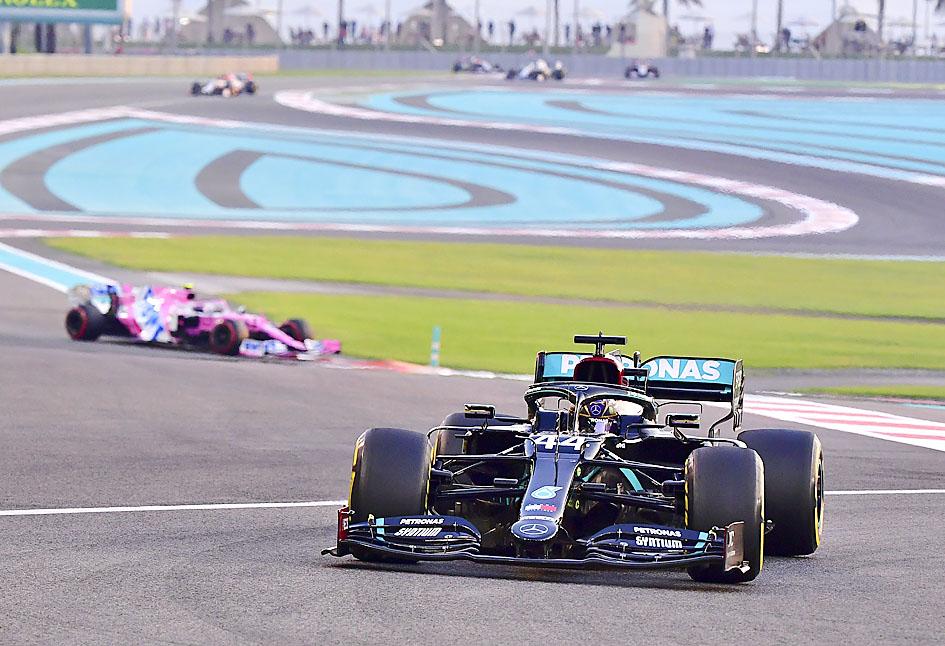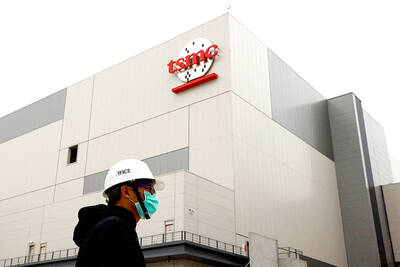Automakers are fundamentally rethinking motorsports for the electric age, so much so that even the team dominating the highest-echelon auto-racing circuit must break new ground.
Mercedes-Benz has won the last seven Formula One championships, but parent Daimler AG is reducing its ownership in the team. While F1 remains valuable from an image perspective, Daimler can now get more bang for its marketing bucks, all while the racing unit also pushes to boost its own revenue outside international race tracks.
Mercedes-Benz Grand Prix Ltd plans to sell more engineering services to external clients.

Photo: AP
By tapping its expertise in optimizing aerodynamics and engine efficiency, as well as crunching complex data, the Brackley, England-based business aims to triple revenue at its applied-science unit to £100 million (US$135 million) by 2025.
The whole venture is pushing to be profitable in two years, Mercedes-AMG Petronas F1 Team chief executive officer Toto Wolff said.
“In Formula One it’s all about speed of delivery, and our speed of delivery of technical solutions that are both competitive as well as safe is something that can be applied across a wide range of areas,” Wolff said in an interview.
Mercedes is one of the world’s most successful racing organizations. Its star driver Lewis Hamilton has won six F1 championships since 2014, with the seventh going to his former teammate, Nico Rosberg.
The dominance faces a fresh test next year when cost caps take effect to reignite competition and make F1racing more sustainable.
Mercedes-Benz does not disclose all spending on F1 operations, but Daimler estimated that the business generated more than US$1.5 billion in equivalent advertising value last year, based on a total television audience of 1.9 billion people, and company chief executive officer Ola Kallenius sees it as valuable test lab for hybrid-engine technology.
Daimler this month announced that it would halve its stake in the team to 30 percent, with Ineos Group joining as shareholder.
The chemical conglomerate founded by UK billionaire Jim Ratcliffe already was one of the F1 team’s main sponsors and has collaborated with the business on sailing and cycling ventures.
With Ineos, Daimler is getting a cash-rich partner as it is cutting costs across the group to finance an expensive shift toward electric vehicles in the midst of a COVID-19 pandemic. Other automakers are paring back their motorsports activities while trying to adapt to a world increasingly shunning the internal combustion engine.
Honda Motor Co in October said that it would leave F1 at the end of this year’s season, while BMW AG and Volkswagen AG’s Audi have announced that they plan to quit Formula E electric-motor racing.
The Volkswagen brand is terminating all motorsports activities and reassigning employees to work on building the industry’s biggest fleet of battery-powered vehicles.
In addition to making external sales efforts, the Mercedes F1 team has deepened collaboration with Mercedes’ AMG performance-car division to bolster offerings of fully or partly electric sports cars. Well-heeled costumers would be able to experience results next year, when the GT four-door hybrid automobile and the Project One supercar hit the road.
The three years that have transpired since Mercedes showed the latter vehicle — a two-seater boasting more than 1,000 horsepower — suggest that there are reasons no other automaker has tried to plug a F1 drivetrain into a vehicle for public roads.
Porsche AG and Toyota Motor Corp have used racing to test technology for road vehicles, but the transfer of know-how mainly focused on areas such as downsized turbo engines or recuperating electric power in hybrid systems.
Adapting sophisticated F1 components such as the exhaust-gas turbocharger and tweaking noise vibration to levels that do not perforate eardrums is expensive.
Still, it is worth the effort, AMG chief technical officer Jochen Hermann said.
“We’re well connected now and learn from each other,” Hermann said in a telephone interview. “The electrification of sports cars is an opportunity we want to seize.”

Stephen Garrett, a 27-year-old graduate student, always thought he would study in China, but first the country’s restrictive COVID-19 policies made it nearly impossible and now he has other concerns. The cost is one deterrent, but Garrett is more worried about restrictions on academic freedom and the personal risk of being stranded in China. He is not alone. Only about 700 American students are studying at Chinese universities, down from a peak of nearly 25,000 a decade ago, while there are nearly 300,000 Chinese students at US schools. Some young Americans are discouraged from investing their time in China by what they see

Taiwan Semiconductor Manufacturing Co (TSMC, 台積電), the world’s largest contract chipmaker, yesterday reported record sales for the first quarter, which analysts attributed to solid demand for emerging technologies. Consolidated revenue totaled NT$592.64 billion (US$18.51 billion) in the January-to-March period, up 16.5 percent from a year earlier, but down 5.26 percent from the previous quarter, TSMC said in a statement. The first-quarter revenue beat analysts’ average projection of NT$579.5 billion, Bloomberg News reported. That performance lends weight to expectations that the world’s most valuable chipmaker would return to solid growth this year after weathering a post-COVID-19-pandemic cratering of smartphone and computer sales. TSMC is budgeting

MAJOR DROP: CEO Tim Cook, who is visiting Hanoi, pledged the firm was committed to Vietnam after its smartphone shipments declined 9.6% annually in the first quarter Apple Inc yesterday said it would increase spending on suppliers in Vietnam, a key production hub, as CEO Tim Cook arrived in the country for a two-day visit. The iPhone maker announced the news in a statement on its Web site, but gave no details of how much it would spend or where the money would go. Cook is expected to meet programmers, content creators and students during his visit, online newspaper VnExpress reported. The visit comes as US President Joe Biden’s administration seeks to ramp up Vietnam’s role in the global tech supply chain to reduce the US’ dependence on China. Images on

New apartments in Taiwan’s major cities are getting smaller, while old apartments are increasingly occupied by older people, many of whom live alone, government data showed. The phenomenon has to do with sharpening unaffordable property prices and an aging population, property brokers said. Apartments with one bedroom that are two years old or older have gained a noticeable presence in the nation’s six special municipalities as well as Hsinchu county and city in the past five years, Evertrust Rehouse Co (永慶房產集團) found, citing data from the government’s real-price transaction platform. In Taipei, apartments with one bedroom accounted for 19 percent of deals last